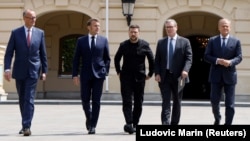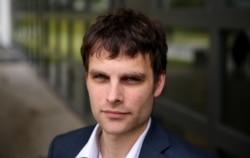Welcome to Wider Europe, RFE/RL's newsletter focusing on the key issues concerning the European Union, NATO, and other institutions and their relationships with the Western Balkans and Europe's Eastern neighborhoods.
I'm RFE/RL Europe Editor Rikard Jozwiak, and this week I am drilling down on two major issues: The reassurance force for Ukraine & the chances of Kyiv and Chisinau being "decoupled" on their respective EU membership paths.
Briefing #1: What A 'Reassurance Force' In Ukraine Could Look Like
What You Need To Know: The Coalition of the Willing, a grouping of over 20 Western countries, is inching closer to finalizing plans for some sort of "reassurance force" for Ukraine. Officials familiar with the talks claim that "discussions have intensified" in recent weeks in European capitals.
Briefing on background after the most recent talks in Paris on September 4, a senior European diplomat noted there has been "increased enthusiasm" for the initiative compared with earlier this year and they are taking "small steps forward" on several issues.
The sudden jolt of action in recent weeks is down to one big movement: The United States is paying attention to the project.
One diplomat speaking under condition of anonymity says Washington now can be seen as an "observer" of the coalition. Even without a concrete "American backstop" as European countries are seeking for the reassurance force to go ahead, both politically and militarily the United States has indicated one may be in the making, they added.
In what shape or form still remains to be seen, but it is believed that the most useful asset would be American intelligence, surveillance, and reconnaissance (ISR), most likely from NATO eastern flank countries such as Poland and Romania.
Deep Background: Several unknowns still dominate the planning for a potential force beyond America's potential role -- crucially the political mandate of a mission and the rules of engagement.
When it comes to the mandate, two things are clear: The force would only become active if there is a cease-fire, and it can only operate upon an invitation from Ukraine. The latter is pretty straightforward, but the coalition is still keen to point out this is a decision by Kyiv and Kyiv only and that Russia cannot veto it in any way. This means it falls outside the auspices of the United Nations or the OSCE.
The coalition is also keen to avoid any form of international force that would include troops from more Kremlin-friendly countries such as Brazil, India, or China.
The cease-fire is a precondition for any boots on the ground, especially as no country is keen to assume any combat roles. Herein lies something of a dilemma as no European diplomat appears to believe the war is about to end anytime soon. Kaja Kallas, the EU foreign policy chief, said recently that she believes Moscow will ramp up the war effort going into the autumn and winter, and various European officials have backed this up by noting they see the conflict potentially dragging on for years.
Drilling Down:
· What about rules of engagement? So far, there isn't much agreement on those either. What is clear is the future force won't be on the contact line.
· The first line of defense is the Ukrainian Army, and the reassurance force comes as a second layer. There are still various options, but the idea is there should be land, sea, and air components.
· Turkey is the lead nation when it comes to the sea component, looking at making sure the Black Sea lanes are free for navigation and potentially being engaged in naval demining.
· Britain and France are expected to take the lead when it comes to the land forces and around eight other nations, mainly in the Nordic-Baltic region, have indicated they are ready to put boots on the ground, as well.
· The goal is to have 25,000-30,000 troops in Ukraine, but it may not be that many. Poland has indicated its role mainly will be that of a logistics hub for the force, while Germany is hesitating and would most probably need parliamentary approval to send any military, a potential obstacle many other nations face as well.
· Another dilemma here is many NATO eastern flank nations fear that officers for a future reassurance force will be pulled from the multinational troops of the NATO battalions placed in on their soil in recent years as a response to Russian aggression in Ukraine. Baltic diplomats in particular have warned the reassurance force mustn't create "gaps" in the military alliance's defense.
· The land component of the reassurance force would most likely be placed in western Ukraine, with the Lviv area being the most obvious location. The Yavoriv military base, which was used to train Ukrainian troops by Western army personnel before the Russian full-scale invasion, would according to some sources be a natural hub, especially if the reassurance force has a training component.
· Other options include placing forces around critical infrastructure such as airports and ports as well as in bigger cities like Odesa and Kyiv.
· The air component still needs to be worked out, but the idea is the skies over western Ukraine and eventually central Ukraine should be protected. But here the matter of rules of engagement becomes an issue, as no Western country is ready to, for example, shoot at Russian aircraft if they were to venture over Ukrainian skies -- thus creating a direct confrontation with the Kremlin.
Briefing #2: Ukraine And Moldova Remain Coupled For Now
What You Need To Know: The summer was full of speculation and hints from Brussels officials that Ukraine and Moldova might be separated on their respective paths to eventual EU membership.
The two Eastern European countries have been paired ever since both applied for membership of the bloc in the wake of Russia's full-scale invasion of Ukraine in early 2022. They both got EU candidate status that summer, and in late 2023 EU member states signaled to both that accession talks could start.
But talks haven't started with either of them, and that has to do with Hungary blocking the entire process with Ukraine over what Budapest sees as Kyiv's discrimination of the Hungarian minority in Ukraine.
The Central European country held a consultative referendum earlier this year in which 95 percent of respondents were against Ukrainian EU membership. While most other EU member states dismissed this vote as another political stunt by Budapest, few think the country is willing to lift its veto to start the talks anytime soon.
Some think this is unfair to Moldova, as none of the 27 EU member states has anything against commencing negotiations with Chisinau.
Deep Background: The EU enlargement commissioner, Marta Kos, opened up on the idea of a formal decoupling when speaking to RFE/RL this spring. The idea seemed to gain traction over the summer when Brussels briefly was rattled by President Volodymyr Zelenskyy's sudden move in July to limit the independence of two key anti-corruption agencies.
These sort of political "decouplings" have happened before, most recently last year as Albania was allowed to move forward with membership negotiations while Bulgaria has continued to veto the same steps for its neighbor North Macedonia.
But when the bloc's Europe ministers, which deal with enlargement issues, met in Denmark on September 1-2 there were no words about decoupling Moldova and Ukraine other than it was ruled out -- at least for now.
Drilling Down:
· The reason for this is threefold: a recognition not to give in to what many member states see as Hungarian blackmailing, the feeling that such a move would be strategically disadvantageous for both the EU and Ukraine at the moment, and that it would only have a limited impact on Moldova.
· On the first issue, there is an increasing frustration that Budapest is trying to dictate too much of the EU's policy toward Ukraine already. It's fair to say the country has been successful.
· EU institutional funding, via the European Peace Facility (EPF), for Ukrainian weapons has been blocked for two years already, and later this week European diplomats will most likely accept that Budapest -- together with Bratislava -- will manage to remove some oligarchs from the bloc's Russia sanctions blacklist in order to achieve unanimity for a six-month extension of all the restrictive measures.
· The thinking here is that rather than handing Hungary another win, it could be wise to wait until the Hungarian parliamentary election in April 2026 as polls show the opposition has a real chance of seizing power.
· This would not automatically mean a total reversal of Hungary's Ukraine policy, but few EU officials think while Ukraine is losing precious time, a few more months of waiting is insignificant in a bigger process that can drag on for years or possibly decades.
· Secondly, many of Ukraine's most ardent supporters in the club such as the Baltic states and the Czech Republic immediately started a diplomatic rearguard action against any type of decoupling as soon as rumors started spreading that it was considered.
· Lithuania authored a discussion paper, seen by RFE/RL, in which it argued that the EU-26 -- meaning the entire European Union bar Hungary -- should conduct informal negotiations with both Ukraine and Moldova in the meantime and that negotiations on most of the 33 accession chapters would be opened "in a fast-track manner when EU-27 support is rebuilt."
· Crucially, both France and Germany, the two EU heavyweights, came onboard against any decoupling now especially as the United States has signaled that Ukrainian NATO membership most likely is off the table in any potential future peace negotiation with Russia.
· In this sense, EU membership for Kyiv becomes even more pertinent according to most EU diplomats who see this as the most obvious political and security guarantee that European nations can offer the war-torn nation going forward.
· Finally, there were also signals from Moldova that even Chisinau wasn't too keen on decoupling, at least now. Many European officials had wanted to give the country's pro-EU government a boost ahead of what is expected to be a closely fought parliamentary election on September 28 by opening accession talks a few days or weeks before the vote.
· Others, both in EU capitals and in Chisinau, argued this would only have a limited outcome for two reasons. Firstly, few beyond the corridors of power in Brussels understand the technicalities or the significance of starting EU accession negotiations.
· As one EU diplomat put it to me: "People want to know when their country can join and what it means for them, not when some obscure diplomats meet."
· Secondly, there is a recognition among all EU candidate countries, but notably Moldova, that Ukraine's efforts to fight off the Russian invasion have reignited EU enlargement in general. Chisinau in fact jumped on the coattails of Ukraine in applying for EU membership back in 2022. For now, they will remain connected, but don't rule out that the decoupling debate might start again later in the year.
Looking Ahead
The European Union autumn political season is in full-swing again, and European Commission President Ursula von der Leyen on September 10 will deliver her annual State of the European Union at the European Parliament plenary in Strasbourg.
The speech, which usually takes close to an hour, covers all her political priorities for the upcoming months. Look out for potential new priorities when it comes to sanctions on Russia or a renewed push for EU enlargement.
That's all for this week!
Feel free to reach out to me on any of these issues on X @RikardJozwiak, or on e-mail at jozwiakr@rferl.org.
Until next time,
Rikard Jozwiak If you enjoyed this briefing and don't want to miss the next edition subscribe here.







